The Department of Geography is one of the oldest departments in the University of Yangon. Although it was planned at the University’s foundation in 1920, teaching of geography in the University of Yangon only started in 1924 with Professor Dr. L.D. Stamp. The courses at that time were based on the curriculum of London University. Professor L. D. Stamp, together with his wife, Mrs. L. C. Stamp and Mr. F. G. French, also prepared geography text books for schools. Since then, many foreign scholars have been employed in the department. Myanmar scholars started to serve as tutors in the department in 1934.
During the Second World War, U Phe Maung Tin became the first Myanmar Rector of the University of Yangon. Daw Thin Kyi was assistant lecturer at the Department of Geography in 1943. After national independence, in 1950, Daw Thin Kyi returned from Clark University with a doctorate degree and served as lecturer and head of the department. In June 1951, she became professor and head of the Department of Geography. The number of teaching staff gradually increased.
Courses at that time included physical geography, climatology, economic geography, regional geography and practical geography. Later, geomorphology and human geography were introduced. Historical geography and political geography were taught as an Honours class. Later, new fields in geography, such as the geography of Myanmar, urban geography, land use, soils and biogeography were gradually added. As the education system changed, the courses in geography also changed accordingly.
A post-graduate Diploma in GIS was introduced in 1999 as part of the human resource development programme of the University of Yangon. Since then, more than 500 diploma degree holders have completed the diploma course and are now working in different ministries and in the private sector. The Diamond Jubilee celebration of the Department of Geography was held in 1999.
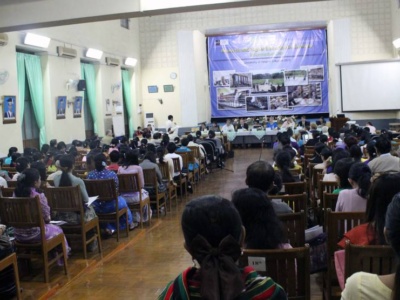
The Centre of Excellence for
Read MoreDr Khin Khin Soe Associate Professor
Daw Aye Aye Kyu Lecturer
Dr Khin San Yu, Lecturer, Department of Geography
Dr Saw Thanda, Lecturer, Department of Geography
International Collaborations
Nowadays, the Department of Geography works closely with international scholars, especially from Germany, the Netherlands and Thailand. (ITC from the Netherlands and Thailand have held international workshops and seminars.)
Collaboration Activities
Oversea Organization
1. Cologne University, Germany
2. Faculty of Earth Science, Oxford University
3. UCRSEA (Urban Climate Change Resilience in Southeast Asia)
4. TEI (Thai Environmental Institute)
5. Faculty of Social Science, ANU (Australia National University)
Local Organization
1. WWF Myanmar
2. MIMU (Myanmar Information and Management Unit)
3. YCDC
4. Department of Housing, Ministry of Construction
5. Department of Rural Road Development, Ministry of Construction
6. Department of Relief and Resettlement
Centre of Excellence (CoE)
The Centre of Excellence (CoE) for Urban and Regional Development started at the University of Yangon in November 2012 with a core working team of Dr. Bay Dar from the Department of Botany, Dr. Zaw Soe Min from the Department of History, Dr. Hla Yin Nu, Dr. Khin Khin Soe and Dr. Zin New Myint from the Department of Geography. Professor Dr Frauke Kraas from the Institute of Geography, University of Cologne, is the key founder of the CoE for Urban and Regional Development. The official opening of the centre took place on 28 July 2014. The Department of Geography is in charge of the CoE.
The Focus of CoE
The major theme of the Centre of Excellence is “Urban and Regional Development”. It was chosen in order to underline the university’s commitment and scientific contribution to the urban and regional development processes of Myanmar. All related academic disciplines can join the research activities. Major areas are environmental change, cultural, economic and social development and rural and urban transformation processes in Myanmar.
Four main activities of the Centre of Excellence
(1) Lecture Series
To present scientific papers or overviews on research themes
(2) Seminar Series
To present and discuss in depth research topics with scholars of various disciplines
(3) Workshop Series on Advanced Academic Skills
To contribute to capacity enhancement for scholars of various universities
(4) CoE Coffee Corner
To create a meeting place to promote interdisciplinary exchange between scholars of the University of Yangon and beyond.
1. Tourism Geography
2. Regional Analysis
3. Environmental Studies
4. Gemorphology
5. Urban Geography
6 Climate Change and Resilience
Nowadays, the Department of Geography works closely with international scholars, especially from Germany, the Netherlands and Thailand. (ITC from the Netherlands and Thailand have held international workshops and seminars.)
Collaboration Partners
1. Cologne University, Germany
2. Faculty of Earth Science, Oxford University
3. UCRSEA (Urban Climate Change Resilience in Southeast Asia)
4. TEI (Thai Environmental Institute)
5. Faculty of Social Science, ANU (Australia National University)
Core Courses of Bachelor of Arts in Geography (Four-year Programme)
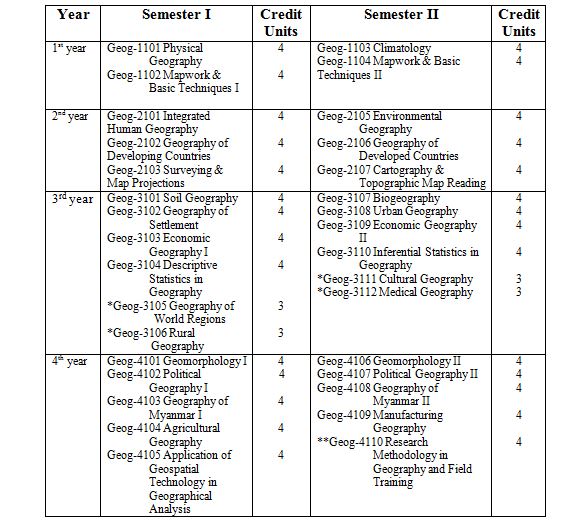
Core Courses of Bachelor of Arts (Honours) in Geography (Five-year Programme)
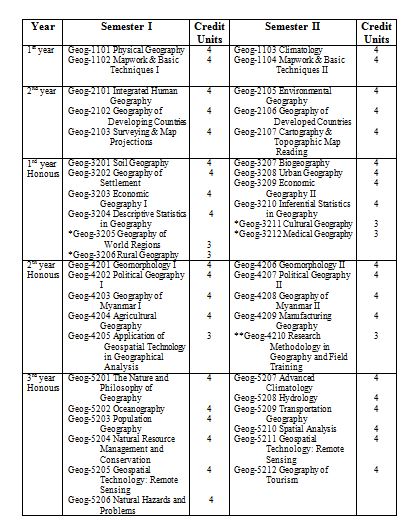
** In partial fulfilment of the requirements for the award of Bachelor of Arts (Honours) in Geography, Third Year Honours Students must take part in occasional field trips / project assignments related to their field of studies, as deemed necessary by the Department of Geography and submit a Term Paper at the end of the second semester.
Semester I

*Elective Courses; a student can choose any one elective below
-AM 1001 (3) Aspects of Myanmar
-ES 1001 (3) Environmental Chemistry I
-ES 1002 (3) Environmental Physics I
-ES 1003 (3) Environmental Geology I
Semester II
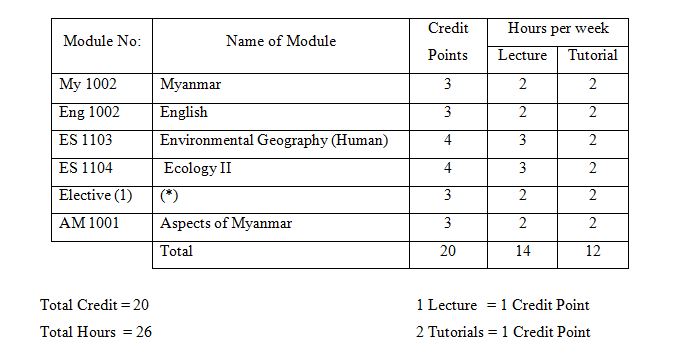
* Elective Courses: a student can choose any one elective shown below
-AM 1002 (3) Aspects of Myanmar
-ES 1004 (3) Environmental Chemistry II
-ES 1005 (3) Environmental Physics II
-ES 1006 (3) Environmental Geology II
Semester I

* Elective Courses
-ES 2104 (3) Geospatial Technology I
-ES 2001 (3) Food Security
– ES 2002 (3) Water Chemistry
– ES 2003 (3) Thermal Physics
– ES 2004 (3) Environmental Psychology
Semester II

* Elective Courses
-ES 2108 (3) Geospatial Technology II
-ES 2005 (3) Environmental Law
-ES 2006 (3) Soil Chemistry
-ES 2007 (3) Thermal Physics
-ES 2008 (3) Environmental Psychology
Semester I

* Electives: A student can choose any one elective shown below
-ES 3001 (3) Geomorphic Environment
-ES 3002 (3) Biodiversity
Semester II
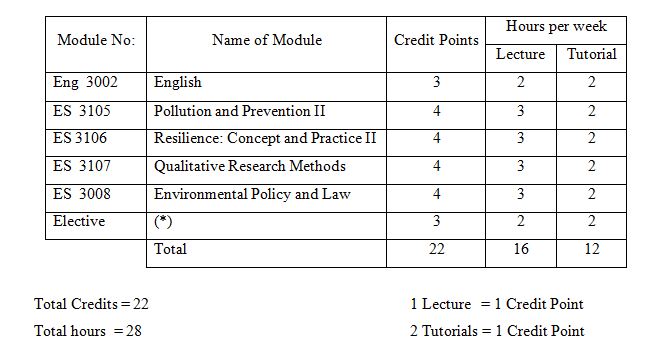
* Electives: A student can choose any one elective shown below.
-ES 3003 (3) Marine and Coastal Environment
-ES 3004 (3) River and Hydrology
Semester I
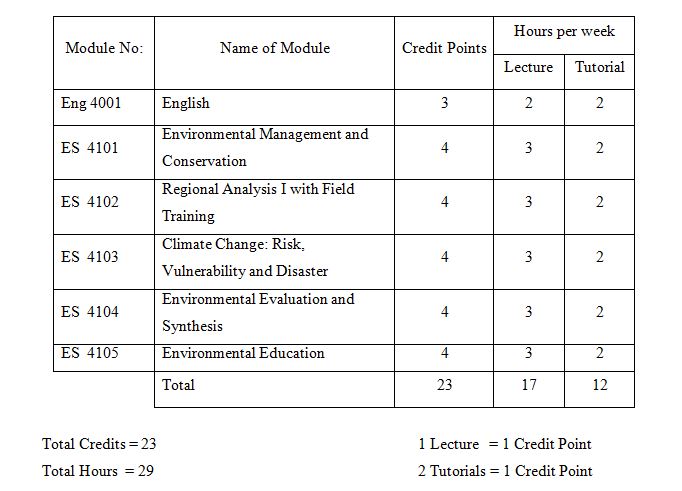
Semester II
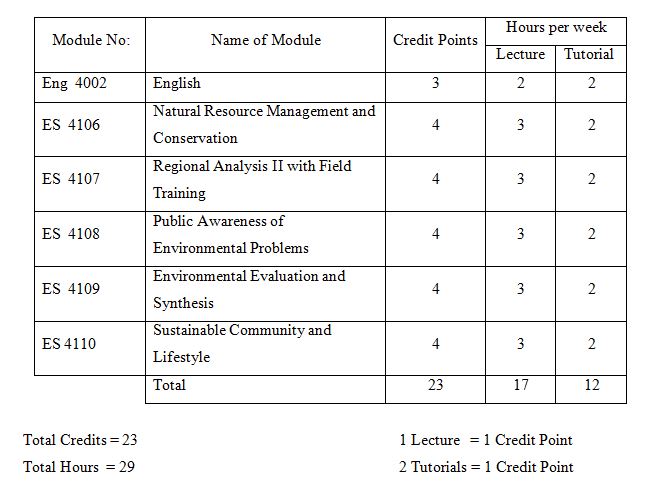
Courses in Master of Arts & Qualifying (Two-year Programme, Total Credit Units 24)
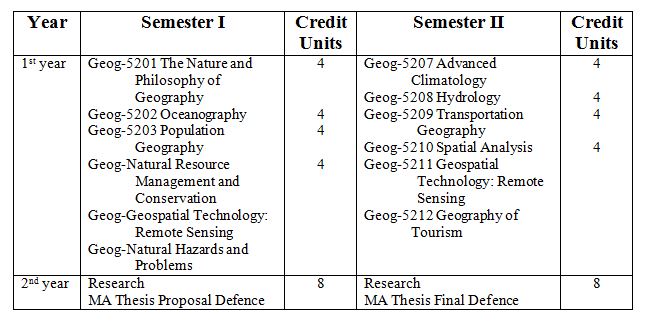
Courses in PhD in Geography (Five –year Programme)

Courses in Diploma in GIS & RS (One-year Programme, Total Credit Units 24)

In partial fulfilment of the requirements for the award of GIS & RS, Diploma Students must take part in occasional field trips / project assignments related to their field of studies, as deemed necessary by the Department of Geography and submit a Term Paper at the end of the academic year.